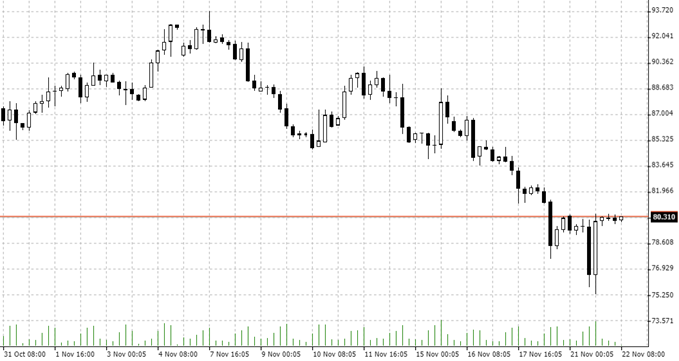

22.11.2022 – Unusual activity in the oil market: according to a press report, Saudi Arabia is trying to patch up its relationship with the United States. And an increase in production is allegedly imminent. The sheikhs are waving it off. But we are curious to see what happens next.
Violent ups and downs in WTI. The blog “The Market Ear” commented on the chart analysis: “Oil is putting in one of the biggest hammer candles we have seen in a long time. As we wrote earlier today: ‘$75 is the must hold level…’ And also, “Last time we had a similar hammer candle (July), although it was less impressive, crude rallied 8 bucks from the candle closing day.” When switching to the four-hour chart, the situation becomes particularly clear. There is thus due movement in the oil market.

What had happened: Initially, the stronger dollar and new Corona concerns about China had pulled oil prices down.
Allegedly higher oil production
The market saw a real sell-off when the “Wall Street Journal”, citing unnamed sources, reported that Saudi Arabia and other OPEC members were planning to increase production. According to the report, an increase in production of up to 500,000 barrels per day will be discussed at the cartel’s next meeting on December 04. The paper speculated that the move could ease tensions between the Biden administration and Riyadh.
Immediate denials
Saudi officials immediately denied this. They said it would remain at the current OPEC+ cut of 2 million barrels per day until the end of 2023, adding that Saudi Arabia always stands ready to intervene if there is a need. There was also immediate opposition from the UAE Energy Ministry, which said there were no discussions between the UAE and other OPEC+ countries about a quota cut.
Moscow threatens
Elsewhere, Bloomberg reported that Ukraine would have to raise transit fees for oil because of Russian attacks. Meanwhile, Moscow reiterated that Russia will not sell oil to countries that have agreed to a price cap. This could lead to lower supply, it said. But this is rather background music in the concert of the Saudis.
Our conclusion: traders and investors need to keep an eye on the real-time news because of a possible Saudi U-turn. Riyadh is moving the market. If the report of an increase in oil production does turn out to be true, the bears will have their work cut out for them. Bernstein Bank wishes good luck!
__________________________________________________________________________________________
The content of this publication is for general information purposes only. In this context, it is neither an individual investment recommendation or advice nor an offer to purchase or sell securities or other financial products. The content in question and all the information contained therein do not in any way replace individual investor- or investment-oriented advice. No reliable forecast or indication for the future is possible with respect to any presentation or information on the present or past performance of the relevant underlying assets. All information and data presented in this publication are based on reliable sources. However, Bernstein Bank does not guarantee that the information and data contained in this publication is up-to-date, correct and complete. Securities traded on the financial markets are subject to price fluctuations. A contract for difference (CFD) is also a financial instrument with leverage effect. Against this backdrop, CFD trading involves a high risk up to the point of total loss and may not be suitable for all investors. Therefore, make sure that you have fully understood all the correlating risks. If necessary, ask for independent advice. CFDs are complex instruments and are associated with the high risk of losing money quickly because of the leverage effect. 68% of retail investor accounts lose money trading CFD with this provider. You should consider whether you understand how CFD work and whether you can afford to take the high risk of losing your money.7
